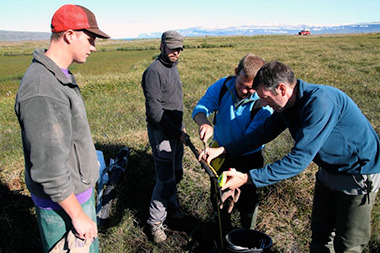Sea-Level and Ice Sheet History in Scotland
Sea-Level and Ice Sheet History in Scotland

Predictions of future sea-level change are of increasing concern with regard to potential influence on coastal environments. One way to better understand changes in the coastal zone in response to future sea-level rise is to improve our understanding of past changes in relative sea level and the coastal response to such changes. The Geography Department here at Durham has a long history of research investigating past changes in relative sea level. One aspect of this research has been the production of well-constrained records of past sea-level changes that can be used to test and improve models of glacio-isostatic adjustment and relative sea-level change. Linked to these models this sea-level data is also used to produce estimates of current land motion shown in figure 1 (uplift and subsidence in response to melting of the British Ice Sheet). This data is incorporated into a climate modelling tool developed by the Environment Agency and used in the production of shoreline management plans for the UK (UK Climate Projections tool – UKCP09).

This project aims to build on current research investigating the relative sea-level record from the Assynt area of NW Scotland (an area for which there is currently very little data available). The sea level data collected here can be used to test the latest geophysical models and ultimately can be used to help refine these models. The project will involve further fieldwork in the Assynt area during the summer of 2014 to sample additional field sites (see figure 2). This will be followed up by preliminary laboratory analysis of the samples collected. This analysis will contribute to the ongoing research reconstructing the relative sea-level history of the Assynt area. This will provide the student with experience of working as part of a larger collaborative research group (involving academics and research students from Durham University and Bristol University). This will also provide specific research skills such field investigation and research design to address a specific research question and also provide an opportunity for the student to develop advanced laboratory skills in collaboration with the research group.

